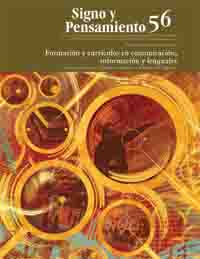Abstract
From a poststructuralist point of view and supported by empiric evidence, this article is an analysis initially focused on the role played by a specific type of university education in shaping the current state of journalism in Bogotá. We round up putting forward the preliminaries of an unexpected hypothesis: in order to capture both markets –students and media– undergraduate programs in social communication and journalism –at least in Bogotá’s universities– tend to adopt a pragmatic and indulgent logic which results in a loss of autonomy as far as the relevant academic field is concerned in detriment of journalistic professionalism.
— (2006), Proyecto para el diseño y elaboración de los exámenes de calidad para la Educación Superior- ECAES para los programas de comunicación e información, Bogotá, Universidad Externado.
Bordieu, P. (1992), El sentido práctico, Madrid, Taurus.
— (1997), Sobre la televisión, Barcelona, Anagrama.
— (2000), Cuestiones de sociología, Madrid, Istmo. — (2001), La distinción. Criterio y bases sociales del gusto, Barcelona, Taurus.
Moncayo, V. M. (octubre, 2007), “La educación superior colombiana. Ante la nueva exclusión del conocimiento”, en Le Monde Diplomatique, año 6, núm. 61.
Monroy Polanía, E. R. y Tovar Sierra J. P. (2009), Formación académica, vías de acceso e identidad profesional de los periodistas en los medios de comunicación nacionales [tesis profesionalización del periodismo], Bogotá, Universidad Sergio Arboleda.
Ortega, F. y Humanes, L. (2000), Algo más que periodistas. Sociología de una profesión, Barcelona, Ariel.
Real Rodríguez, E. (2004), Formación y ejercicio profesional del periodista en la España del siglo xxi dentro del marco de la unión europea, Madrid, Universidad Complutense de Madrid.
Signo y Pensamiento (1997), “Profesiones en juego” [dossier], núm. 31, Bogotá, Facultad de Comunicación, Pontificia Universidad Javeriana.
VV. AA. (2007), Intertextos No. 2. Educación para la comunicación social, Bogotá, Facultad de Comunicación Social de la Universidad Jorge Tadeo Lozano.
This journal is registered under a Creative Commons Attribution 4.0 International Public License. Thus, this work may be reproduced, distributed, and publicly shared in digital format, as long as the names of the authors and Pontificia Universidad Javeriana are acknowledged. Others are allowed to quote, adapt, transform, auto-archive, republish, and create based on this material, for any purpose (even commercial ones), provided the authorship is duly acknowledged, a link to the original work is provided, and it is specified if changes have been made. Pontificia Universidad Javeriana does not hold the rights of published works and the authors are solely responsible for the contents of their works; they keep the moral, intellectual, privacy, and publicity rights.
Approving the intervention of the work (review, copy-editing, translation, layout) and the following outreach, are granted through an use license and not through an assignment of rights. This means the journal and Pontificia Universidad Javeriana cannot be held responsible for any ethical malpractice by the authors. As a consequence of the protection granted by the use license, the journal is not required to publish recantations or modify information already published, unless the errata stems from the editorial management process. Publishing contents in this journal does not generate royalties for contributors.


